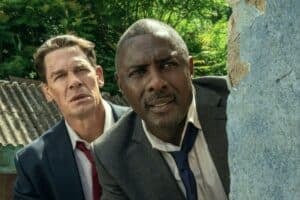The film should be seen by those who are living the reality of being displaced, landless and oppressed by apartheid.

As the internationally recognised, locally produced feature film High Fantasy, directed by Jenna Bass, is soon to show at Cape Town’s Labia Theatre and Johannesburg’s Bioscope Independent Cinema on today and tomorrow respectively, the cast who reflect the Fallist generation comment on the personal and potential public impact of the movie.
High Fantasy follows a group of diverse young friends who mysteriously swap bodies while on a camping trip on a remote farm and are forced to reassess their friendships.
Director Jenna Bass and her stellar cast (Qondiswa James, Nala Khumalo, Francesca Varrie Michel, Liza Scholtz and Loren Loubser) collaborated in the writing and production, creating a workshop film with truly diverse perspectives shot entirely with an iPhone 7.
Why do you think a body-swap comedy works so well to explore identity politics in a country like South Africa?
Liza Scholtz (LS): When people laugh, there is some sort of emotional connection. Doing a bodyswap movie with interwoven issues allows the audience to digest these issues in a new, imaginative way. To be confronted by themselves and by “the other” in an alternative creative format. I think using wacky, imaginative tactics to feed people back to themselves is a good way to get them to eat their veggies.
https://www.instagram.com/p/Bp6cP3LBbUK/
What was the motivation to focus on the themes of race, gender, politics within a SA millennial context?
Jenna Bass (JB): I tell stories about what is important to me in my own life. And at the time, these topics were at the forefront of my mind and many others around me. Not only were these conversations happening everywhere, they were all part of the same conversation: despite the rainbow nation promises, the system does not work for all, and we do not accept it.
What did shooting on iPhone mean for the production process?
JB: Most importantly, it meant that the cast – the storytellers of this film – could literally participate on a far more collaborative level in showing how they saw things. The selfie format really allowed the filming to be an extension of their acting. The only challenge was that the iPhone would shut down at 40ºC… and it was hot in the Northern Cape.
https://www.instagram.com/p/BlyVbe0FyfB/
Everything about this film’s creation is radical and innovative. How were you stretched as performers?
Francesca Varrie Michel (FVM): Before this process, I thought I was a liberal and understood, but very quickly I realised I had a lot to learn. On a personal level, I will never be able to understand, but I can try to by listening. On an acting level this process was brutal. It was spiritually, physically, mentally and emotionally hectic.
We are dealing with reality in this film so our hearts and minds were locked 24/7 for 2½ weeks in that space, in the middle of nowhere with no escape. I wouldn’t have traded this experience for anything because it was a team effort to put this film together and to know that everyone had multiple responsibilities and were all doing this for the same reason made it that much more rewarding.
Loren Loubser (LL): I’ve learnt that just being able to represent LGBTQIA (lesbian, gay, bisexual, transgender, queer or questioning, intersex, and asexual or allied) people without even saying it is important. My character doesn’t clearly mark their race, gender identity or their sexuality and that allows audiences to identify and ask questions.
Nala Khumalo (NK): Personally, High Fantasy made me realise that I could define for myself what it is to be a man, and in doing that I became brave, which ultimately emancipated me. This allows me look at myself without the influence of anyone’s opinion or gaze, so when you meet me, it’s the real Nala.
LS: Developing trust in the process, trust in your own creative decisions. By having so much creative control there is also more pressure of failure, with filming and writing the script, and acting as one of your co-stars. It was a lot of pressure. So, trust is a big one.
https://www.instagram.com/p/BpQ7fPmh8Wq/
What do you hope that the audience comes to understand about your character?
Qondiswa James (QJ): The collaboration in the project has meant bringing in some of myself. My existence is protest. There is no stereotype. There is no type, I guess, not in the way I experience my existence. How do you not make a stereotype? You begin from scratch. You craft every character layer by layer.
FVM: That she (Lexi) is angry about what she represents, because she detests what her ancestors have caused.
NK: I hope Thami serves as a reflection for men. Men’s role as men in society, which I believe is a small step in putting an end to patriarchy, is not to interfere with women’s journey of emancipation or women’s lives. We, as men, police way too many things in women’s lives because of our own insecurities.
Why should South Africans and other audiences experience High Fantasy?
LL: All races, ages, genders and identities should watch it. It should go into schools and be seen by those who can create a movement and those who are living the reality of being displaced, landless and oppressed by apartheid.
For more news your way, download The Citizen’s app for iOS and Android.






